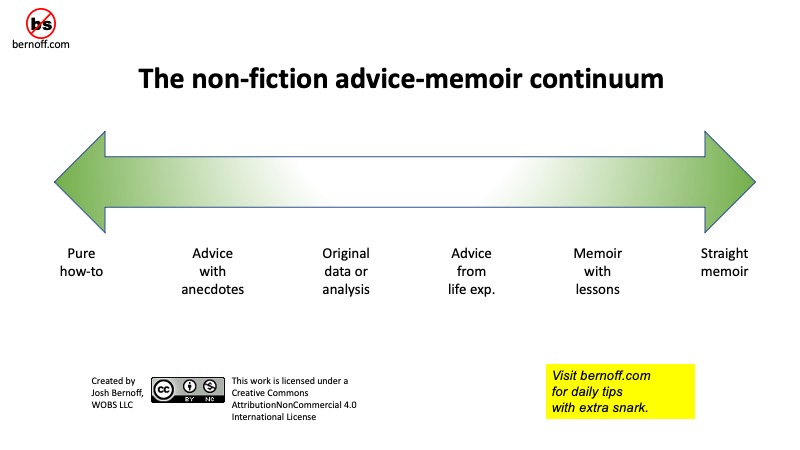Are you writing a memoir or an advice book? Avoid the murky middle.
It is tempting to add personal stories to a book of advice, or bits of advice in a memoir. When mixing the two genres, though, be careful not to mix your objectives, or readers will find your book confusing.
The challenge here is one of tone. Recall the ROAM analysis: Readers, Objective, Action, iMpression.
Consider a book of advice, such as a strategy or self-help book. Here’s the ROAM analysis:
- Readers: People in a given field or job hoping to improve.
- Objective: Reveal a new way of looking at the field.
- Action: Follow the advice in the book to be more productive or profitable.
- iMpression: The author is an authority in the field.
In contrast, here’s how it looks for a pure memoir:
- Readers: General audience looking to be entertained.
- Objective: Fascinate and move the audience with stories.
- Action: Follow the author’s exploits in other media.
- iMpression: What a fascinating person!
If you attempt to create a book that does both of these at once, you cannot possibly succeed. But there are ways to put a little of each genre into the other without everything collapsing.
The advice-memoir continuum

Your book can occupy any point on the continuum from straight how-to to chummy memoir. Here are some variations, along with my caveats on how best to approach them, with notes on tone.
Pure how-to or strategy book
A pure advice book will include only data, analysis, case studies, and recommendations. The tone is professional. You can still make it more immediate by adding words like “you,” but the book includes only rare instances of “I” or “we.”
Advice book with a few anecdotes
Authors often have personal experiences, for example with clients, that can illuminate their advice. Dropping a few of these in here and there does not detract from the authoritative nature of the book — if the number is limited. But if you have 20 case studies and 10 of them are about your personal experience, you lose credibility. The tone in such a book should remain professional, without too many revealing personal details. You should organize the book according to the ideas you are describing. The book is not about you, it’s about how to do things right, and a few of your own experiences can help with that. A good example is Rebecca Otis Leder’s book Knock.
Original data or analysis
If you collected original data, the book is going to be clearly written from your point of view. Even so, you should not be at the center of the narrative. It is about what you found, not about you. Such books will include plenty of instances of I and we, but not a lot of personal information about the author. The organization should follow the ideas, not your journey of discovery. Examples include The Transparency Sale, Everybody Lies, and Diane Hessan’s new book about voters, Our Common Ground.
Advice book based on life experience
Some people’s lives are full of lessons. It’s certainly fine to write a book about the lessons you’ve learned and how they apply. The proper way to structure such a book is according to the lessons, not your life. One example is The Signal and The Noise by Nate Silver. Books like this are tricky to write — the more personal stories you tell, the less credible your authoritative advice becomes.
Memoir with lessons
This genre is similar to a straight memoir — you should write it with a full description of your emotions and experiences, in the order you had them. But you get to pause from time to time to describe what you learned and what that might mean for readers. The best example I can think of is Delivering Happiness by Tony Hsieh, a description of his journey to creating the company Zappos.
Straight memoir
In a straight memoir, you just tell your story in chronological order, concentrating on the fascinating experiences you had.
Pick a spot on this continuum, then pay close attention to tone
It’s pretty simple. The more you talk about your personal feelings, the less authority your advice book will have. It’s very tempting for authors to put a lot of themselves into their books. Try to do that by being passionate and clear about what you have to say, not who you are. While it may be possible to write about your voyage of discovery and enlighten people at the same time, it’s very difficult. If you fail, your reader will wonder why you’re so emotional in the middle of a book about how to be efficient with your time, or how to set up a marketing department.
When you must tell your own story in such a book, do it exactly the same way you’d tell anybody else’s. Your experience becomes a case study narrative just like all the others in the book.
Don’t just delete that emotional writeup, though. Even if it doesn’t make it into the book, it may be useful when you finally write your memoirs.